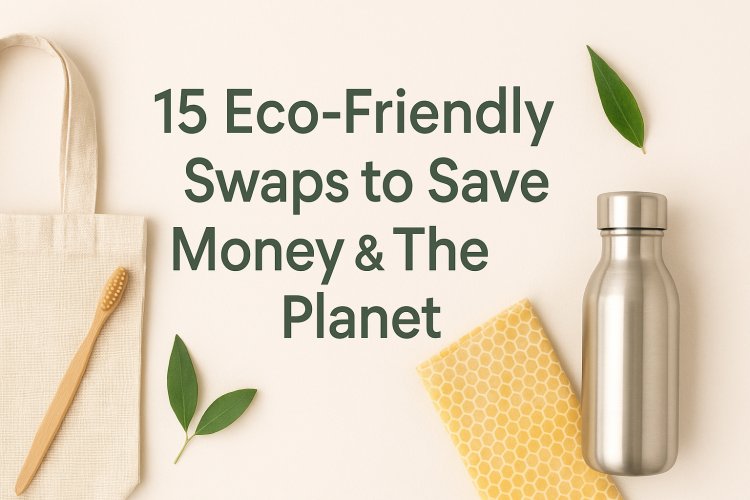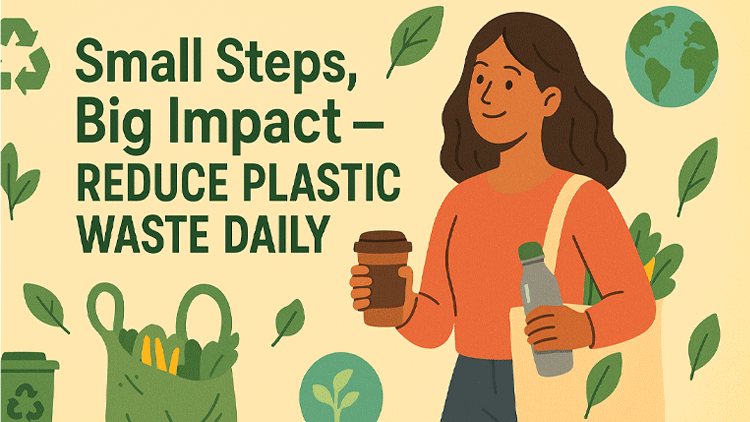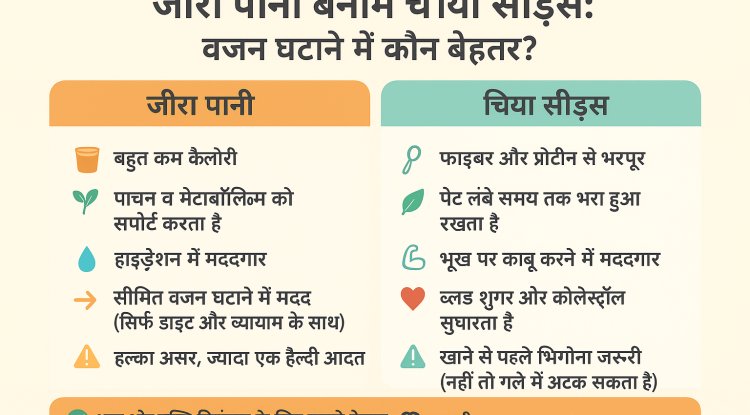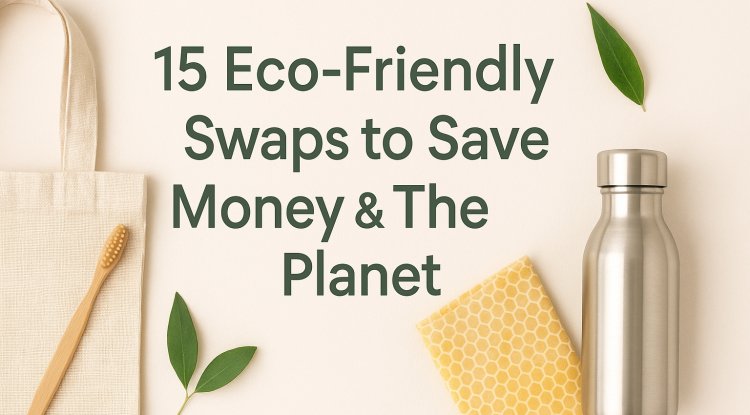15 Eco-Friendly Swaps That Save You Money Every Month & Help the Planet
Living sustainably doesn’t have to be costly or complicated. These 15 eco-friendly swaps help you save money while protecting the planet. From reusable bags and bottles to natural cleaners and home-cooked meals, each small change makes a big difference in your lifestyle and the environment.
15 Eco-Friendly Swaps That Will Save Money & The Planet
In today’s world, eco-friendly living isn’t just about saving the environment—it’s also about saving money. Many people assume that going green requires expensive organic products or premium sustainable goods, but in reality, the most effective eco-friendly swaps are simple lifestyle changes. They not only reduce waste but also cut down your monthly expenses.
If you’re ready to protect the planet while keeping more cash in your pocket, here are 15 eco-friendly swaps you can start today.
1. Swap Plastic Bags for Reusable Cloth Bags
Plastic bags are among the biggest contributors to pollution, clogging waterways and harming wildlife. A simple switch to durable cloth or jute bags reduces waste and lasts for years. While you may pay a small upfront cost, you’ll quickly save money by avoiding repeated purchases of plastic or paper bags at stores.
Savings Tip: Keep a couple of foldable cloth bags in your car or purse for spontaneous shopping trips.
2. Swap Disposable Bottles for Stainless Steel or Glass Bottles
Single-use plastic water bottles are expensive over time and harmful to the environment. Investing in a sturdy stainless steel or glass bottle cuts costs while keeping your water cool and toxin-free. Plus, most reusable bottles last for years with proper care.
Planet Bonus: You’ll prevent hundreds of bottles from ending up in landfills annually.
3. Swap Paper Towels for Reusable Cloth Towels
Paper towels seem convenient but they add up in cost and waste. Switching to washable microfiber or cotton cloths is not only eco-friendly but also far more durable. A single set of reusable towels can last years and handle more cleaning than endless paper rolls.
Extra Tip: Cut up old t-shirts into rags for an even cheaper option.
4. Swap Plastic Straws for Stainless Steel, Bamboo, or Silicone Straws
Plastic straws are used for minutes but remain in the environment for centuries. A reusable straw set is inexpensive, easy to clean, and travel-friendly. Many even come with cleaning brushes and cases.
Savings: Restaurants often charge for straws now—bring your own and skip the fee.
5. Swap Disposable Coffee Cups for a Reusable Mug
That daily coffee run creates mountains of waste if you rely on paper cups. A stylish thermos or travel mug saves both the environment and your wallet—many cafés even offer discounts for bringing your own cup.
Pro Tip: Choose an insulated mug to keep your drink hot or cold for hours.
6. Swap Chemical Cleaners for DIY Natural Cleaners
Most household cleaning products are loaded with harsh chemicals and plastic packaging. Instead, you can easily make cleaners from vinegar, baking soda, and lemon juice. They’re inexpensive, effective, and safe for children and pets.
Savings Example: A single bottle of vinegar can replace window cleaner, surface spray, and even fabric softener.
7. Swap Fast Fashion for Thrifted or Sustainable Clothing
Cheap, trendy clothes may look good today but quickly wear out, costing more in the long run. Choosing thrifted, second-hand, or sustainable clothing saves resources and money. High-quality pieces also last longer, reducing the need for constant replacements.
Planet Impact: The fashion industry is one of the largest polluters—every eco-friendly clothing choice matters.
8. Swap Plastic Wrap for Beeswax Wraps or Silicone Lids
Plastic cling wrap is wasteful and non-recyclable. Beeswax wraps, silicone lids, and glass containers are reusable alternatives that keep food fresh without constant waste. While beeswax wraps may seem pricey upfront, they last up to a year with proper care.
Bonus: They look much nicer in your fridge than crumpled plastic wrap.
9. Swap Disposable Razors for a Safety Razor
Disposable razors generate tons of plastic waste and cost a fortune over time. A classic stainless steel safety razor requires only inexpensive blade replacements, making it more sustainable and cost-effective.
Long-Term Savings: You’ll save hundreds of dollars over a lifetime compared to buying plastic cartridges.
10. Swap Buying New for Borrowing or Renting
Instead of buying new tools, books, or appliances you rarely use, consider borrowing from friends or renting. Libraries, tool-sharing groups, and online rental services make this easy and affordable.
Planet Impact: Reduces manufacturing demand and prevents rarely used items from gathering dust.
11. Swap Disposable Batteries for Rechargeable Batteries
Constantly buying single-use batteries wastes money and creates hazardous waste. Rechargeable batteries may cost more upfront, but they last through hundreds of charges. Pair them with a solar charger for maximum eco-friendliness.
Savings: A four-pack of rechargeable batteries can replace hundreds of disposable ones.
12. Swap Plastic Toothbrushes for Bamboo Toothbrushes
Billions of plastic toothbrushes end up in landfills each year. Bamboo toothbrushes are biodegradable, affordable, and just as effective. Some even come with compostable packaging.
Tip: Pair them with eco-friendly toothpaste tablets to reduce even more waste.
13. Swap Single-Use Menstrual Products for Reusable Options
Pads and tampons create enormous amounts of waste. Switching to menstrual cups or reusable cloth pads saves money and reduces landfill contributions. A single menstrual cup can last up to 10 years.
Financial Savings: You could save hundreds annually by ditching disposable products.
14. Swap Driving Daily for Walking, Cycling, or Public Transit
Car use contributes to air pollution, traffic, and fuel expenses. Walking or biking saves money, boosts health, and lowers emissions. For longer commutes, public transportation is still cheaper and greener than driving alone.
Planet Bonus: Fewer cars mean less congestion and cleaner air.
15. Swap Buying Processed Foods for Cooking at Home
Pre-packaged meals are expensive, unhealthy, and come with tons of plastic packaging. Cooking at home using fresh ingredients not only reduces waste but also saves you a significant amount of money. Plus, it’s healthier and allows you to control portions.
Extra Tip: Buy in bulk with reusable containers to cut packaging waste further.
Final Thoughts
Living sustainably doesn’t mean sacrificing convenience or comfort. By making these 15 eco-friendly swaps, you’ll reduce waste, save money, and contribute to a healthier planet. Each change may seem small on its own, but together, they create a powerful impact.
The best part? Most of these swaps pay for themselves in weeks or months, proving that going green is also financially smart. Start small, stay consistent, and you’ll see both your wallet and the world thanking you.
What's Your Reaction?






















